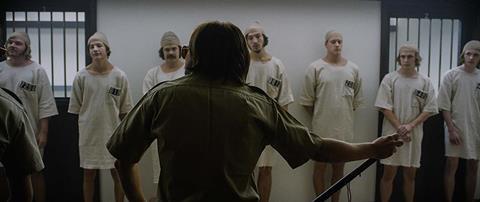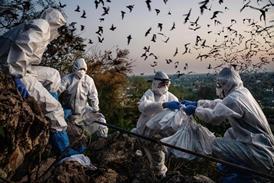Dir: Kyle Patrick Alvarez. US, 2014. 122mins

The Stanford Prison Experiment recreates a 1971 academic study that observed how people could be made to mistreat each other. The grim film is sure to make the audience uncomfortable.Kyle Patrick Alvarez’s stark period drama reconstructs the notorious Stanford inquiry with a cast of mostly young unknowns. Billy Crudup plays the researcher who devised the study. The prospect of witnessing an experiment that will shock or disgust the audience isn’t a strong marketing tool.
Kyle Patrick Alvarez’s film revisits an ominous project which is now part if the canon of social psychology.
Yet the drama will still travel the festival circuit, for its novelty, and for its dramatic revelations about human behavior in the San Francisco Bay Area, which was celebrated at the time for a campus hippie culture of peace and love. Echoes of Abu Ghraib and Guantanamo should ensure media coverage.
The Stanford Prison Experiment film faces competition. Experimenter, Michael Almereyda’s portrait of another academic study on the individual’s capacity to cause pain, also premiered at Sundance. Experimenter is a more polished film, with major stars and an elegant production design, but The Stanford Prison Experiment holds the edge on raw discomfort. In the absence of a trend for films on academic studies of pain infliction, the two films will divide a limited market.
Kyle Patrick Alvarez’s film revisits an ominous project which is now part if the canon of social psychology. In the summer of 1971, the psychologist Philip Zimbardo at Stanford placed a newspaper ad seeking participants for a study that required young men to play prisoners or guards, and paid them $15 a day. This time, for $15 or less, the audience shares two hours of torment.
Most of the youths in 1971 did it for the cash, and chose to play prisoners – less work, and nobody likes guards, one said – and the study created its prison in the cramped hallways of a Stanford building. From the start, the youths playing guards were abusive, humiliating the prisoners and threatening physical harm. The guards and Zimbardo ignored a signed contract that ruled out physical aggression. As the emotional toll mounted, Zimbardo, under pressure, terminated the study after five days.
The uneasy power of Alvarez’s version of the experiment, well-edited by Fernando Collins, is in its young cast, playing students who inflict pain with no remorse in close quarters. In the bare-boned “prison,” the devolution into abuse is relentless — the boys playing prisoners are forced to wear uniform hats and dresses, and the guards turn sadistic, a reflection of the system in which they’re operating, Zimbardo argued.
Lord of the Flies, offering a parallel dilemma, took place on a tropical island. The location here is sterile academia. Close-ups against the stark white walls track the tension.
On the other side of the academic curtain is Billy Crudup playing Zimbardo as a cold scientist observing the subjects’ abuse by video camera, and shrugging off evidence of real pain. The veteran actor shortchanges Zimbardo with a one-dimensional performance, and looks as if he’s made up with a beard and longish hair for the re-enactment of 1970’s television. It’s a puzzling approach to the role, since the actual Professor Philip Zimbardo, whose lectures can be seen on the internet, speaks with a distinctive Bronx accent, and tends to be passionately orotund. Instead, Crudup’s emotionless character watches with detachment – a victim of his own study?
Acting by Zimbardo’s team in the film is similarly flat, yet the very crudeness of Alvarez’s take on the project, with guards carrying clubs and prisoners dressed alike, compounds an inconvenient truth which remains a classic discovery in social psychology.
The drama makes you wonder why the abuses at Abu Ghraib prison came as such a surprise.
Production companies, Backers: Abandon Features, Sandbar, Coup d’Etat Films
International sales: UTA Independent Film Group ronson_r@unitedtalent.com
Producers: Brent Emery, Lizzie Friedman, Karen Lauder, Greg Little, Lauren Bratman
Executive producers: Katie Leary, Bob Leary, Brian Geraghty
Screenplay: Tim Talbott
Cinematography: Jas Shelton
Production design: Gary Barbosa
Editor: Fernando Collins
Music: Andrew Hewitt
Main cast: Billy Crudup, Jack Kilmer, Ezra Miller, Olivia Thirlby, Ki Hong Lee, Michael Angarano, Moises Arias, Tye Sheridan, Callan McAuliffe, Johnny Simmons, Chris Sheffield, Nelsan Ellis, James Frecheville, Thomas Mann, Nicholas Braun





















